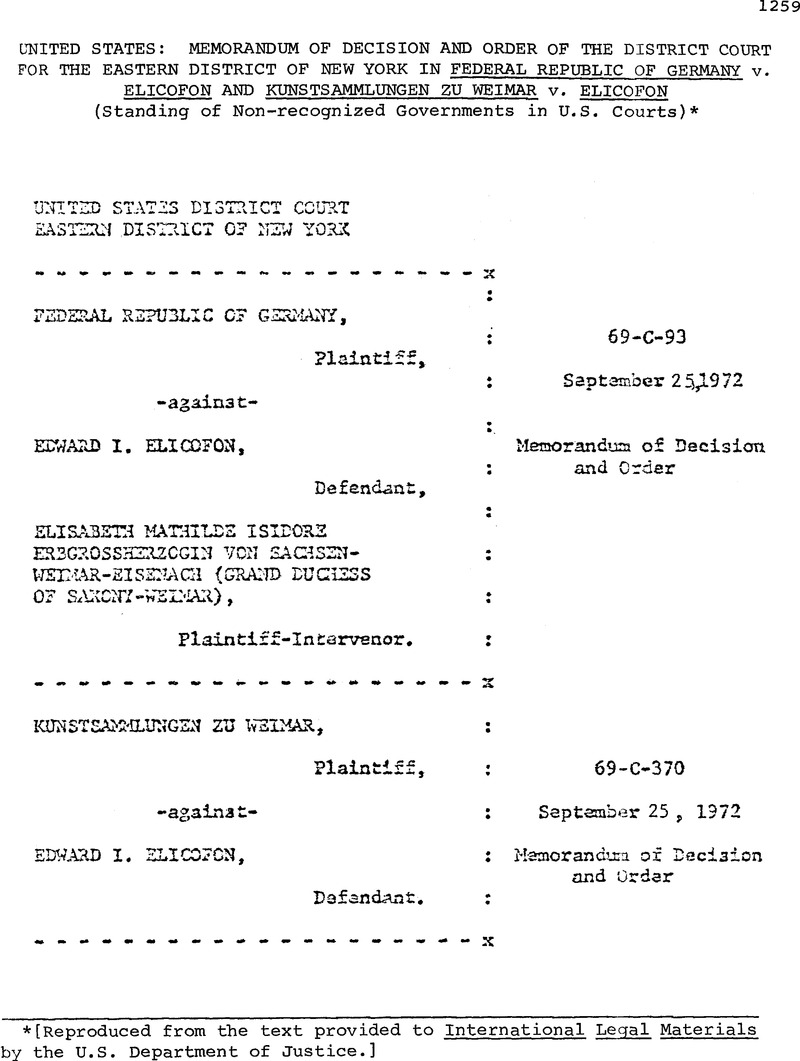No CrossRef data available.
Published online by Cambridge University Press: 04 April 2017

[Reproduced from the text provided to International Legal Materials by the U.S. Department of Justice.]
1 The State Department denied applications for vises for the purpose of entering the country to testify. Thereupon the parties agreed to depositions of thees witnesses.
2 The law enacted on July 29, 1952 in the Volkshammer eliminated “länder” and substituted fourteen districts or counties called Bezirke. The law states in part: “* * * The effectives guidance and control of the lower [State] instrumentalities by the higher ones * * * must be as assured.
Sec.1(1) The Laender shall reconstruct their territories into Districts.
(2) The demarcation of the Districts shall be arranged in such a way that it is adequate to the economic necessities and than the execution of all State tasks especially the effective guidance and control of the State instrumentalities in the communities is assured.
3 ARTICLE 43 of the Constitution states in part:
(1) The People’s Chamber is the supreme organ of state power in the German Democratic Republic. It decides in its plenary sessions the basic questions of state policy.
4 ARTICLE: 31 of the Constitution states in part:
(1) The local popular representative bodies are the organs of state power in the districts, regions, towns, muinicipal boroughs, local communities and associations of local communities, elected by citizens hiring the right to vote.
5 ARTICLE 41 of the Constitution states:
The socialist enterprises, towns, local communities and associations of local communities are, within the framework of central state planning and management, self-responsible communities in which citizens work and shape their social relations. They safeguard the basic rights of citizens, the effective linking of individual and social interests, and a multifole-social-political and cultural-intellectual life. They are protected by the Constitution. Interference with their rights is permissible only en the basis of law.
The Official Explanation of Article 41 is the following:
“Article 41 orosuraes a necessary coordination of central state planning and direction with the initiative of the workers who cooperate in these local communities.... Only the state as instrument of the worker’s class and its associates can guarantee the realization of the social conditions, the central structure and the coordination of the economy with other social areas such science, education, and culture through decisions binding en everyone and everyone’s actions. In the system of socialism, centr.nl state planning and direction are organically linked with the self-responsibility of the communities, in accordance with the principles of docucratic centralisam.”
6 ARTICLE 31 of the Constitution states in part:
(2) The local popular representative bodies decide, on the basis of law and on their own responsibility, on all matters which concern their area and its citizens. They organize popular cooperation in the shaping of political, economic, cultural and social life, and cooperace with the social organizations of the working people.
7 The responsibility of all leading employees In the state and economy towards citizens is guaranteed by a system of reporting back.
The Official Explanation of Article 33 is the following:
“At the same time, the principle of democratic centralism in the composition and structure of Leadership of state and economy entails the duty in each instance to render account to the immediately superior organ, all the way up to the central state organs, which, in turn, must render account to tae highest representative body the Volkskammer, The control over implementation and the ensuing duty to render account of the execution of deleted tasks is in essendal part of the actual governing of the socialist state.”
The Law concerning the state budget of the German Democratic Republic (December 15, 1963) declared that the central budget was “organically integrated with tha district and city budgets.”
9 The court does not decide the question of the validity of these conveyances. It is noted, however, that Bezirke replaced Lander in 1952 and the form of Land as a political subdivision was eliminated in 1353. There is also a serious question as to whether Land Thuringia had title a on the data of the alleged conveyance. The claim of title in .any Lancer or states is based on an order Issued by the Soviet Militury Administration during the-Soviet occupation on October 24.1915
10 Article 10 of the Constitution defines three classes of “socialist property” as follows:
(1) Socialist property exists in the following forms:
as nationally owned property of society as a “whole, as joint cooperative property of collectives of working people,
and
as the property of social organisations of citizens.
11 The United States, which has filed a suggestion of interest and memoranda opposing intervention by the Weimar Art Collection, considers that the 1923 treaty still applies to the area of East Germany.